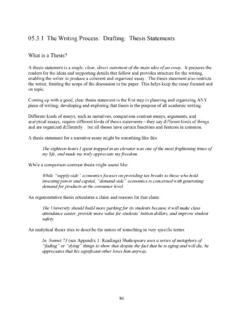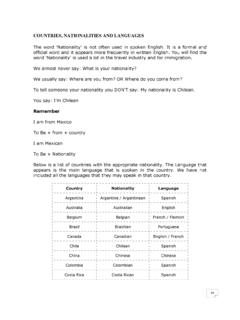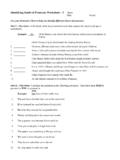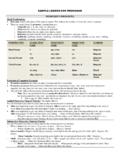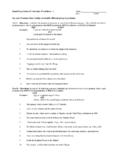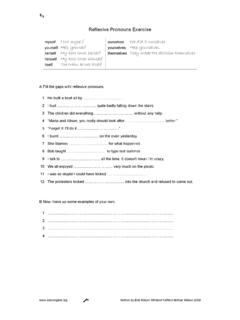Transcription of 06.8 Pronouns - OpenWriting.Org
1 209 Pronouns A pronoun is a word that takes the place of a noun to avoid repetition. These words stand in for the proper names of people, places, things, or ideas to enable writers to vary the style and sound of their sentences. We use Pronouns so frequently in English that often we do not even notice when we are using them. Here are some examples of Pronouns at work. Example 1 (without Pronouns ): John went to John s house so John could wait for John s visitors. Example 1 (with Pronouns ): John went to his house so he could wait for his visitors. Here, the writer replaces the second, third, and fourth references to John with Pronouns ; this sounds natural and clear in English.
2 Not using Pronouns would sound overly formal, even foreign or strange, to most native speakers of English. Without replacing John with Pronouns , one might wonder if the writer was referring to multiple individuals named John in Example 1. Consider another example: Example 2 (without Pronouns ) Mary will take Mary s children to the daycare center so that Mary will have time to cook. Example 2 (with Pronouns ): Mary will take her children to the daycare center so that she will have time to cook. The same idea is at work here: the Pronouns make the writing sound clear and natural, and inform the reader that the sentence refers back to the Mary mentioned earlier in the sentence.
3 Pronoun Antecedents The noun that the pronoun refers to or stands in for is known as the antecedent (an-tee-cee-dent) of the pronoun. For example 1. John said that he will travel tomorrow. (The pronoun is he, and John is the antecedent). 2. The children played with their toys. (The pronoun is their, and children is the antecedent). Agreement with Antecedents Pronouns must always agree in person, number and gender with their antecedents. 210 Here are some examples: 1. If a person wants to write an essay, he or she should start with a pre-writing technique. (the antecedent is singular, so the Pronouns are singular as well) 2.
4 If people want to write essays, they should start with pre-writing techniques. (the antecedent is plural, so the pronoun they is plural) 3. Each computer has its own monitor. (singular antecedent, singular pronoun) 4. Both computers have their own monitors. (plural antecedent, plural pronoun) 5. If the team is able, they will play the game and not forfeit. (plural antecedent, plural pronoun). Exercise: Pronoun Antecedents Correct each use of Pronouns below to agree with its antecedent. 1. If people think they will succeed, he or she will. Antecedent _____ Correct Pronoun _____ 2. Each soldier has their own backpack with lots of gear in it.
5 Antecedent _____ Correct Pronoun _____ 3. Somebody dropped their homework on the ground. Antecedent _____ Correct Pronoun _____ 4. Mavis or Calliope left his glass on the counter. Antecedent _____ Correct Pronoun _____ 5. All of the students liked her new teacher. Antecedent _____ Correct Pronoun _____ 6. Calvin or DeJuan bought their car at CarPlace. Antecedent _____ Correct Pronoun _____ 7. Everyone must wash their hands before sitting down for lunch. 211 Antecedent _____ Correct Pronoun _____ 8. Phillip remembered that the other student had forgotten their permission slip for the field trip. Antecedent _____ Correct Pronoun _____ 9.
6 Nobody is willing to give up their Saturday off to make the compliance deadline. Antecedent _____ Correct Pronoun _____ 10. The teams cannot play its best when it has not trained. Antecedent _____ Correct Pronoun _____ Types of Pronouns Pronouns can be divided into several categories. They are personal Pronouns , relative Pronouns , demonstrative Pronouns , indefinite Pronouns , and reflexive Pronouns . Personal Pronouns Personal Pronouns refer to a specific person or thing, and are divided into three forms depending on how they are used in a sentence. These forms are subjective (a pronoun used as subject or actor in a clause), objective (a p ronoun used as an object or thing that is acted upon in a clause), and possessive (a pronoun used to indicate possession/ownership).
7 Pronouns that act as the subject or actor in a clause: Singular Plural 1st person I We 2nd person You You 3rd person He, She, It They Pronouns act as subjects / actors in two essential ways: before a verb as a subject, and after a linking verb. Here are some examples of the pronoun used before a verb as a subject: 1. She is my sister. (She is the subject of the verb is) 212 2. He did not tell me that he would be visiting my classroom this morning. (He is the subject of the verbs tell and be) 3. They didn t complete their homework on time. 4. She is taller than I. (This is a tricky one the I is the subject of a word that is implied here, am.)
8 The meaning of the sentence is She is taller than I am. ) 5. She dances better than I. ( She dances better than I dance. ) Note: When dealing with sentences with than in them, try to figure out the verb that is left out; put the verb in, and the correct pronoun will be easier to find. She dances better than me is not standard usage it would translate to She dances better than me dance, which would strike most speakers of English as non-standard usage. Here are some examples of a pronoun used after a linking verb like is, am, was, are. 1. It is I who am responsible for the failure in communication, not my staff.
9 2. The winner of the race was he. 3. What was he thinking, jumping off the table like that? 4. Where was she when the crime was committed? Objective Pronouns Objective Pronouns are used for all other purposes; they are often the object of the verb and are not the primary actor in the clause. Singular Plural 1st person Me Us 2nd person You You 3rd person Him, her, it them Here are some examples of Objective Pronouns at work: 1. The store didn t tell us that the furniture had arrived. 2. Ella didn t want to go out on a second date, but she let me down easy. 213 3. My dad went to the store with Sam and me. (In this sentence, me is not the subject /actor and does not rename the subject.)
10 To know whether you are correct, separate the sentence by saying: a. My dad went to the store with Sam. (Correct) b. My dad went to the store with me. (Correct) c. My dad went to the store with I. (Incorrect) Possessive Pronouns Possessive Pronouns show ownership over something. Singular Plural 1st person My (Mine) Our (Ours) 2nd person Your (Yours) Your (Yours) 3rd person His, Her, Hers, Its Their (Theirs) Here are some examples of Possessive Pronouns at work. 1. That book is mine. 2. My car is a 1994 Ford Taurus. 3. Have you received your access code yet? 4. To put it nicely, their collective pants are on fire; one cannot believe a thing they say.
